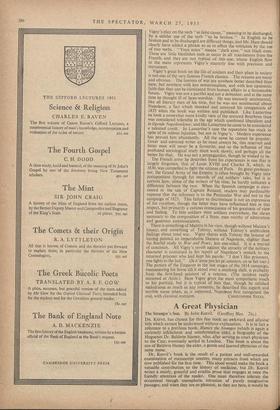Alfred de Vigny
HERE is an admirable translation of one of the great books of French literature. Vigny's passionate and clear prose offers a challenge to translators in exacting measure. In the eighteenth century the languages of France and England so often marched together that smooth interchange was usually possible, but by Vigny's time they had begun to follow separate national paths once more, and it is very difficult to make English out of such French as his without recourse to stiffness or affectation. Vigny's title "Servitude et Grandeur Militaires" is in itself a poser. Mr. Hare's boldness in the choice of an equivalent here is excellent,,but once or twice in the text he neglects to follow his own good example. He tries to reproduce Vigny's play on the verb "se faire casser," meaning to be discharged, by a similar use of the verb "to be broken." In English to be broken and to be discharged are different things, find Mr. Hare should clearly have added a phrase so as to effect the witticism by the use of two verbs. " Yeux noirs" means "dark eyes," not black ones. These are little bleniishes such as occur in all translations from the French, and they are not typical of this one, whose English flow in the main represents Vigny's masterly line with precision and movement.
Vigny's great book on the life of soldiers and their place in society is not one of the very famous French classics. The reasons are many and obvious. The horrors of war are nowhere better described than here, but nowhere with less sensationalism, and with less optimistic faith that they can be eliminated from human affairs in a foreseeable future. Vigny was not a pacifist and not a debunker, and at the same time he thought ill of hero-worship. He was intensely sentimental, like all literary men of his time, but he was not sentimental about Napoleon, a fact which shocked and annoyed his compatriots of 1835 when the book was written and published. Like Lamartine he took a somewhat more kindly view of the restored Bourbons than was considered tolerable in the age which combined liberalism and la ldgende Napoliontenne, and like Lamartine he came to be considered a talented crank. In Lamartine's case the reputation has stuck in spite of its odious injustice, but not in Vigny's. Modern experience has proved him abundantly. All the same he cannot be popular. Great and admired writer as he must always be, this reserved and bitter man will never be a favourite, and so the influence of this profound sociological study must work slowly, and perhaps all the better for that. He was not a propagandist, though he wished to be.
The French army he describes from his experiences is one that is largely forgotten, that of Louis XVIII and Charles X, which, in 1830, was compelled to fight the citizens of Paris. Its great predeces- sor, the Grand Army of the Empire, is often brought by Vigny into juxtaposition through his records of old soldiers' tales, but it is curious how, alone of the writers of his time, he hardly indicates a difference between the two. When the Spanish campaign is men- tioned in the tale of Captain Renaud, readers may pardonably suppose that the reference is to the Peninsular War and not to the campaign of 1823. This failure to discriminate is not an expression of his royalism, though the latter may have influenced him in this respect, but primarily a curious consequence of his greatness of view and feeling. To him soldiers were soldiers everywhere, the slaves necessary to the composition of a State, men worthy of admiration and generous commiseration.
There is something of Maistre in his view, though without Maistre's lunacy, and something of Tolstoy, without Tolstoy's ambivalent feelings about total war. Vigny shares with Tolstoy the honour of having painted an imperishable likeness of Napoleon, slighter than the fearful study in War and Peace, less one-sided. It is a marvel of concision. All Vigny's revolt against the atrocity of the military character is contained in his report of Napoleon's remark to the returned prisoner who had kept his parole: "I don't like prisoners, one fights to the last." (Je n'aime pas les pr:sonniers, on se fait tuer.) The picture of the Emperor in the last stages of the 1814 campaign, manoeuvring his horse till it stood over a smoking shell, is probably from the first-hand account of a veteran. (The incident really occurred at Arcis.) Here Vigny gives the most sympathetic touch to his portrait, but it is typical of him that, though he relished melodrama as much as any romantic, he described this superb and terrible scene when, as is supposed, Napoleon first recognised the



















































 Previous page
Previous page